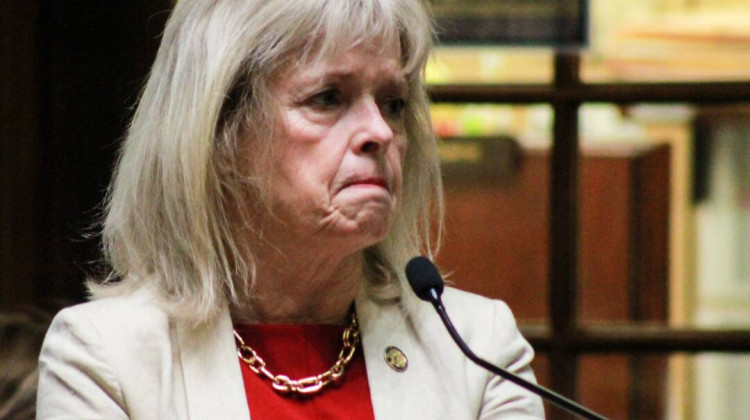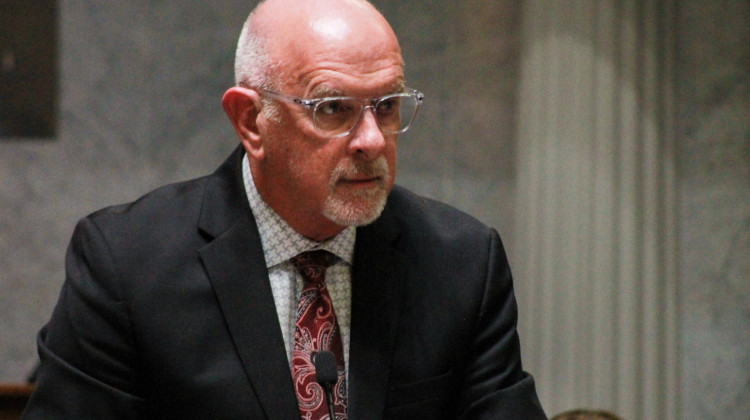
John Dietrick, a special Marion County Superior Court judge, will consider a request from U.S. Senate candidate John Rust, who is seeking a preliminary injunction that would allow him to appear on the May ballot.
Getty ImagesA Marion County judge will hear arguments next month over whether to suspend an Indiana law that U.S. Senate candidate John Rust says unfairly precludes him from appearing on the ballot.
The underlying lawsuit was filed in the Marion County Superior Court last month as part of Rust’s effort to get his name on the May 2024 primary ballot. Rust maintains that a current Indiana law blocking him from the primary ballot is unconstitutional.
Indiana Secretary of State Diego Morales, the Indiana Election Commission and Jackson County Republican Party Chair Amanda Lowery are named as defendants.
John Dietrick, a special Marion County Superior Court judge presiding over the case, said in a Wednesday order that he’ll consider Rust’s request for a preliminary injunction on Nov. 1. It’s not clear how long it could take Dietrick to issue an opinion, however.
The law in question requires a person wanting to run as a Democrat or Republican to have voted in that party’s primary the last two times they voted. The county party chair can sign off on the candidacy if the person doesn’t meet the requirement.
Also included in the latest court filings is the 148-page transcript from Rust’s three-and-a-half-hour deposition. Questioning from attorney Jim Bopp with the Indiana Attorney General’s Office, as well as from counsel for Lowery, took place last week in Indianapolis.
Rust, an openly gay Hoosier running as a Republican who chaired his family’s Seymour-based Rose Acre Farms until last month, entered the race for the GOP nomination in September. His main challenger is U.S. Rep. Jim Banks, who is the party’s favored contender in the race.
Rust in the hot seat
During the Oct. 11 deposition, Bopp questioned Rust’s assertion that “the only way” he can access the ballot is if his county party chairperson certifies him. Bopp said Rust could run as an Independent or Libertarian, or wage a write-in campaign as a Republican. He suggested, too, that Rust could run as a Democrat, given his voting record with county chair approval.
Rust maintained that he is a Republican and seeks to run as such.
“I’m not a Democrat,” Rust said. Throughout the deposition, he repeatedly told Bopp, “I’m a Republican.”
Bopp noted that Rust cannot officially file his candidacy with the Indiana Election Division until Jan. 10, and that between now and then, the Jackson County Republican chairperson could still sign-off on his declaration.
Rust acknowledged that possibility but said it seemed unlikely.
“(Lowery) said she will not sign it, and so that’s harming me because I’m running and I want — I need — to be able to raise money and stuff like that,” he said.
When questioned about his voting record, Rust held that he was not able to vote in the 2020 Republican primary because he was working on his family’s farm on the date of the rescheduled election day.
“If I was doing something at work, I needed to be there,” he said. “If I’m working, taking care of chickens, it’s a business and I felt I had to be there.”
Even so, Bopp said Rust could have voted absentee.
Rust said he made sure to vote in the 2016 Republican primary, however, because he wanted to vote for Ted Cruz.
But in 2008, 2010 and 2012, he voted in the Democrat primaries: “There were candidates that were Democrats that were pro-business and pro-agriculture that I felt needed support,” Rust said in his deposition.
Rust said he voted in 2008 for his “very conservative” brother David Rust Jr. — although he ran as a Democrat. He also pointed to his vote for Jerry Otte, a “distant relative” Rust said he attended church with. Otte ran as a Democrat for township office and for state convention delegate positions.
Rust said he further voted in 2012 for Democrat candidate John Starr, a personal friend, who was seeking a county council seat.
Rust said he left other portions on his primary ballots blank and that he did not vote for other Democrats, including in presidential and gubernatorial races.
Bopp additionally spent considerable time questioning Rust about his legal residence and address listed in candidate filings for his family’s farm in Seymour. Rust clarified that the residence he lives at differs from the P.O. Box listed for his mailing address because the post office does not provide service to his rural home.
Paul Mullin, representing Lowery, also questioned Rust during the deposition.
Mullin pressed Rust about his commitment to the Indiana Republican Party and involvement with the Jackson County GOP. Rust said he was “generally aware” of the Indiana Republican Party platform but that he had not read the party’s 2022 platform, specifically.
Still, Rust maintained that he agreed with the state GOP’s core positions and that he’s active with the Jackson County Republican Party, citing recent attendance at local dinners and other party events.
Mullin later asked Rust which Republican members of Congress he admires.
“Oh, lots,” Rust said in response. “Ted Cruz, obviously, he’s one. Rand Paul. There’s lots of very good conservative Republicans — Mike Braun.”
County and state officials respond
In an affidavit filed after Rust’s deposition, Lowery said she had “no recollection of seeing Rust attend any county party events or any Republican candidate or officeholder events or forums.”
She also had no recollection of seeing Rust at any Indiana Republican Party events, including annual dinners, nor could she remember any times in the last decade when Rust volunteered for the county party.
Lowery reiterated that she will not approve Rust’s candidacy because of his voting record, but also because of his “failure to attend” Jackson County Republican Party and Indiana State Republican Party events, as well as his lack of volunteer work and financial contributions to support GOP candidates at the state and local levels.
Lowery has repeatedly indicated that she will not sign off on any candidate who did not pull a Republican ballot in the last two primaries the person voted in, as required by the state statute.
Rust voted in the Republican primary in 2016 but did not vote in the 2020 or 2022 primaries. He needs a waiver because the last two primaries he voted in were Republican in 2016 and Democrat in 2012.
Rust is now seeking a preliminary injunction that would allow him access to the 2024 Republican ballot.
Lowery and the attorney general’s office agreed in separate court filings that Rust’s request for an injunction lacks merit.
The defendants argued that he still has other options to run for U.S. Senate, and that Lowery has a right to deny him a waiver. They additionally maintain Rust is not a true Republican, and that he “improperly conflates running for political office and running as a candidate for a specific political party.”
“(Rust) can run as a candidate for U.S. Senate regardless of whether he is certified to run in the Republican Party’s primary election or not,” the attorney general’s office said in its response to Rust’s Motion for Preliminary Injunction. “He can campaign, fundraise, and communicate to voters about his policy outlook now. Just because he may not be able to run in the Republican Party primary election does not stop him from running for office.”
 DONATE
DONATE






 Support WFYI. We can't do it without you.
Support WFYI. We can't do it without you.